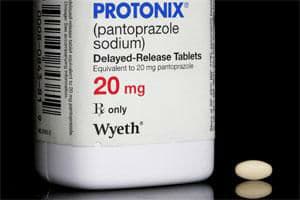
Free Confidential Lawsuit Evaluation: If you or a loved one was injured, you should contact our law firm immediately. You may be entitled to compensation by filing a suit and our lawyers can help.
What’s the Problem?
Protonix (generic: pantoprazole) is a proton pump inhibitor (PPI) medication used to treat stomach and esophageal problems such as acid reflux. The drug works by decreasing the amount of acid the stomach makes. Unfortunately, this same mechanism of action may also increase the risk of kidney problems such as acute interstitial nephritis (AIN).
Protonix Nephritis Studies
Protonix has been linked to acute interstitial nephritis in the following studies:
- A January 2004 study published in the Annals of Pharmacotherapy reported on a 77-year-old woman who was hospitalized with symptoms of elevated serum creatinine, oliguria, arthralgia, fatigue, fever and bilateral flank pain after taking the 40 mg daily dose of Protonix for 2 months. The patient was diagnosed with AIN, and the researchers found a “highly probable” likelihood that Protronix caused the condition.
- The Canadian Medical Association Journal (CMAJ) reported in March 2009 on a 57-year-old man presented to hospital with progressive malaise, myalgia, fever, nausea, vomiting, diarrhea, polyuria and polydipsia. He reported beginning treatment with Protonix 6 weeks earlier. “Our patient was diagnosed with acute interstitial nephritis likely caused by the use of pantoprazole,” the researchers said.
- CMAJ again reported on a case of acute interstitial nephritis associated with Protonix in January 2013, this time in a 73-year-old man who was hospitalized with nausea, fatigue and lack of appetite. The man had been taking Protonix for 2 months prior to his hospital admission. Tests confirmed a diagnosis of AIN consistent with a “probable adverse drug reaction.”
FDA Warning and Label Change
The U.S. Food & Drug Administration (FDA) in December 2013 updated Protonix labels to include a warning about acute interstitial nephritis, stating the condition could occur at any time during treatment with the drug. Nephritis is a kidney disease that is commonly associated with allergic reactions to medications in the bloodstream. The condition is characterized by sudden inflammation in the kidneys and swelling of the interstitial tissue between tubules. AIN may also be referred to as “tubulo-interstitial” nephritis.
Nephritis Symptoms
Symptoms of acute interstitial nephritis may include:
- Blood in the urine
- Fever
- Increased or decreased urine output
- Mental status changes (drowsiness, confusion, coma)
- Nausea, vomiting
- Rash
- Swelling of the bod (any area)
- Weight gain (from retaining fluid)
Treatment
Patients with nephritis should talk to their doctor about quitting the drug or switching to a heartburn medication with fewer side effects. PPI-induced nephritis almost always resolves within a few months upon cessation of therapy. The longer AIN goes untreated, the higher the risk the condition will progress to kidney failure.
Do I Have a Protonix Acute Interstitial Nephritis Lawsuit?
The Class Action Litigation Group at our law firm is an experienced team of trial lawyers that focus on the representation of plaintiffs in Protonix lawsuits. We are handling individual litigation nationwide and currently accepting new AIN cases in all 50 states.
Free Confidential Case Evaluation: Again, if you were diagnosed with acute interstitial nephritis after using Protonix, you should contact our law firm immediately. You may be entitled to compensation by filing a suit and we can help.
